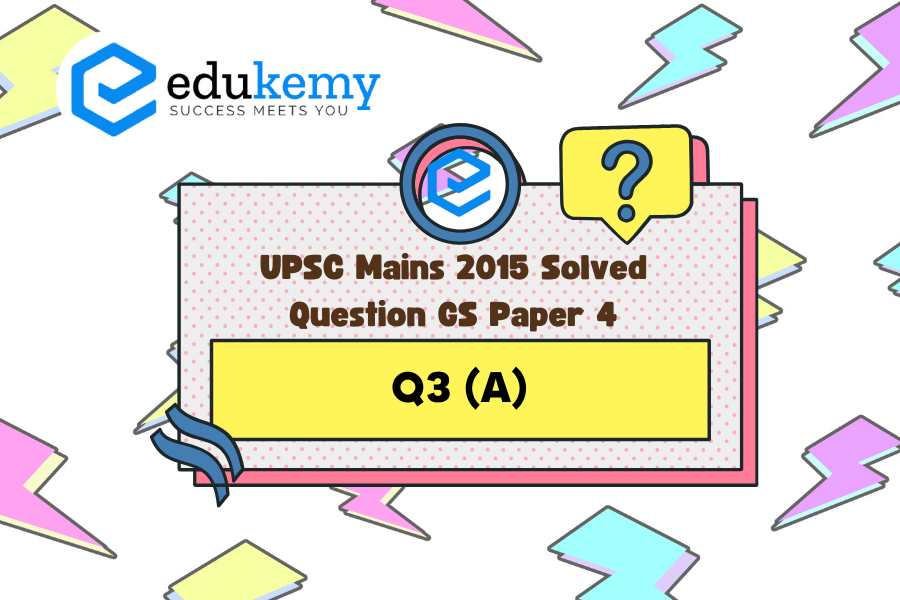The Union Public Service Commission (UPSC) is the apex recruiting body in India responsible for selecting candidates for various prestigious civil services positions. In 2015, the General Studies Paper 4, also known as the Ethics, Integrity, and Aptitude paper, presented candidates with a challenging array of questions aimed at evaluating their ethical and moral reasoning, decision-making abilities, and overall aptitude. This paper, a critical component of the UPSC examination, tests not only the knowledge but also the character and judgment of aspiring civil servants. Let’s delve into the solved questions of the UPSC 2015 GS 4 paper to gain insight into the rigorous standards expected of future administrators and leaders in India.
Contents
- 1 Q3. (a) “A mere compliance with law is not enough, the public servant also has to have a well developed sensibility to ethical issues for effective discharge of duties” Do you agree? Explain with the help of two examples where (i) an act is ethically right, but not legally and (ii) an act is legally right, but not ethically. (150 Words, 10 Marks)
- 2 Decoding the Question:
- 3 Answer:
- 4 In case you still have your doubts, contact us on 9811333901.
Q3. (a) “A mere compliance with law is not enough, the public servant also has to have a well developed sensibility to ethical issues for effective discharge of duties” Do you agree? Explain with the help of two examples where (i) an act is ethically right, but not legally and (ii) an act is legally right, but not ethically. (150 Words, 10 Marks)
Tags: Public/Civil service values and Ethics in Public administration: Status and problems; ethical concerns and dilemmas in government and private institutions; laws, rules, regulations and conscience as sources of ethical guidance; accountability and ethical governance; strengthening of ethical and moral values in governance; ethical issues in international relations and funding; corporate governance.
Decoding the Question:
- In the Intro, try to justify well developed sensibility of a public servant for the effective discharge of duties.
- In Body,
- Explain the different facets of the relationship between law and ethics with the help of examples.
- In Conclusion, try to suggest measures to ensure the effective discharge of duties on the part of the Public Servant.

Answer:
A well-developed sensibility to ethical issues is required by Civil Servants for effective discharge of their duties. A civil servant is required to have ethical literacy, ethical competence and moral reasoning abilities which are significant due to following reasons:
- Better policy formulation and implementation.
- A better interpretation of law and its enforcement.
- Bridging the gap between people and administration.
- Ethics to fill the vacuum which is left by law.
- Greater understanding of the needs of people.
- Effective and holistic approach towards problem solving.
- Optimum utilization of resources available.
So, both compliance with law and ethics are required for a civil servant. However there may be
situations when only one of them is fulfilled.
(i) An act is ethically right, but not legally:
Abortion maybe considered legally wrong but a rape victim may be allowed such an act under ethical grounds. A person who does this is acting ethically but illegally.
(ii) An act is legally right, but not ethically:
- The implementation of the Land Acquisition Rehabilitation and Resettlement Act has led to internal displacement of indigenous people for development which can be legally correct but ethically doesn’t stand on sound ground with respect to the people displaced.
- Legally it may be a right action for army personnel to conduct raids and even killing a suspect in states where AFSPA is applicable for national security. But ethically killing is wrong because it is depriving the citizens of their basic human rights, including their right to get justice and right to life from the court of law.
Hence, for a public servant to perform his duties to a society in an efficient manner, it is better to have laws flexible enough to accommodate the ethical actions.
In case you still have your doubts, contact us on 9811333901.
For UPSC Prelims Resources, Click here
For Daily Updates and Study Material:
Join our Telegram Channel – Edukemy for IAS
- 1. Learn through Videos – here
- 2. Be Exam Ready by Practicing Daily MCQs – here
- 3. Daily Newsletter – Get all your Current Affairs Covered – here
- 4. Mains Answer Writing Practice – here


